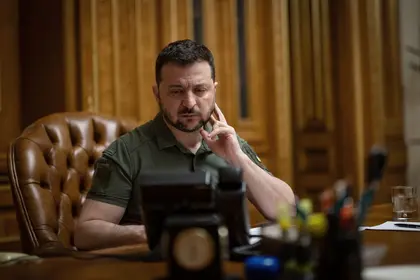In a major diplomatic development on Wednesday, President Zelensky spoke by phone with Chinese President Xi Jinping - the first time the two leaders have spoken since the beginning of Russia’s full-scale invasion last year.
The nearly one-hour discussion, which reportedly included Xi advocating for peace negotiations, was met by Russian accusations that Ukraine was undermining efforts to end the fighting.
Beijing proposed a vague political solution to the conflict that includes a call for dialogue and respect for all countries’ territorial sovereignty. But Ukraine has long said it would not negotiate with Vladimir Putin and that peace would only be possible after Russia withdrew its troops.
Here’s how the big players on the global stage reacted…
The EU
Brussels welcomed the call, describing it as “an important, long overdue first step by China in exercising its responsibilities as a member of the UN Security Council,” AFP reports.
Officials were careful to stress that any talk of peace or a negotiated settlement – something China is pushing for – is done on Ukraine’s terms.
European Commission spokesman Eric Mamer, added: “China’s leadership needs to use its influence to bring Russia to end its war of aggression, restore Ukraine's territorial integrity and respect its sovereignty, as a basis for a just peace.”

Ukraine: Putin Confirms Attack with New Missile
EU foreign policy chief Josep Borrell also welcomed the development, in comments during a visit to Colombia. “It's a first step. But it's an important first step,” he told journalists in Bogota.
“It is very important that China talks with Ukraine, I want to remind you that we all want peace,” he added, speaking to them in Spanish before a formal news conference in English.
“If anyone wants it, needs it - and is asking for it - it's Ukraine.
“But everyone has to understand that it is not just any (peace)... It has to be a just peace that recognises the rights of the people of Ukraine.”
The US
The White House lauded the phone call, with White House national security spokesman John Kirby telling reporters: “We think that's a good thing.”
“Now, whether that's going to lead to some sort of meaningful peace movement or plan or proposal, I just don't think we know that right now,” he added.
Just like the comments from the EU, Kirby was careful to stress that any talk of peace or a negotiated settlement is done on Ukraine’s terms.
“We have long said we want this war to end,” he said, adding that it could end "”immediately” if Russia would pull its troops out of Ukraine.
“If there's going to be a negotiated peace, it's got to (be) when President Zelensky is ready for it ... where he can do it from a position of strength,” Kirby said.
“We certainly would welcome any effort to arrive at a just peace, as long as that peace could be just, could be sustainable, and could be credible,” said Kirby. “And in our view, it’s not going to be sustainable or credible unless the Ukrainians and President Zelensky personally is invested in it and supportive of it.”
Russia
The Kremlin views China as its ally in the conflict – President Putin and President Xi cemented their relationship last month when the Chinese leader visited Moscow. Xi described the trip as a “journey of friendship, cooperation and peace.”
China has sought to portray itself as a neutral party in the Ukraine conflict despite strong ties with Russia. It has not condemned Moscow’s offensive.
So perhaps predictably, Moscow was absolutely furious about yesterday’s call.
Moscow accused Kyiv of undermining any peace attempts, with Russia’s foreign ministry saying: “The Ukrainian authorities and their Western minders have already shown their ability to mess up any peace initiatives.”
Moscow noted “the readiness of the Chinese side to make efforts to establish a negotiation process.”
It accused Kyiv of having rejected “any sensible initiatives aimed at a political and diplomatic settlement.”
“The eventual consent to negotiations is conditioned by ultimatums with obviously unrealistic demands,” it said.
Brazil
Although he didn’t comment directly on the call between Zelensky and Xi, it’s worth looking at comments made by Brazilian President Luiz Inacio Lula da Silva on Wednesday as they are indicative of global leaders who aren’t fully backing Ukraine in the conflict.
Lula, a 77-year-old former metalworker who served two previous terms as president from 2003 to 2010, has resisted taking sides over the conflict, neither with Europe and the United States, nor with China and Russia.
During a visit to Spain, he said there was “no use now in saying who is right” in the conflict and his comments came after he set off a storm among Western allies by stating earlier this month that they were prolonging the fighting by supplying arms to Ukraine.
“No one can doubt that Brazilians condemn Russia’s territorial violation of Ukraine. The mistake happened and the war started,” he said.
“There is no use now in saying who is right, who is wrong. What we have to do now is stop the war,” he added at a joint press conference with Spanish Prime Minister Pedro Sanchez.
“No one in the world is talking about peace except for me, it is like being alone screaming in the desert."”
He raised hackles earlier this month by saying Washington should stop “encouraging” the war by supplying weapons to Kyiv.
Lula also angered Ukraine in recent days by suggesting it should agree to give up the Crimea peninsula, which Russia forcefully annexed in 2014 in a prelude to its full-scale invasion of Ukraine last year.
You can also highlight the text and press Ctrl + Enter






